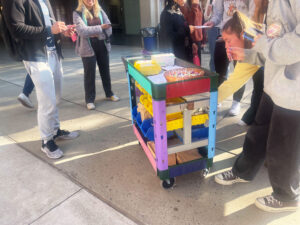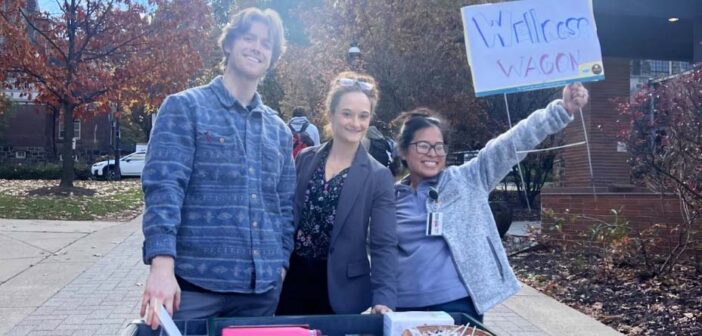Advertising condoms from a multicolored plastic cart draws the occasional weird look from passers-by on campus, but that doesn’t stop Ben Johnson from trying to entice as many people as he can to grab health and wellness supplies.
Johnson is the graduate assistant for the Health Advancement & Prevention Strategies Office. The cart he pushes around — dubbed the Wellness Wagon — is filled with free resources such as naloxone, which is used to prevent opioid overdoses; menstrual products; pregnancy tests; toothbrushes; toothpaste; hair ties and condoms. Of these products, emergency contraceptives are the only items that require purchase and are priced at $11.
Located near the Fairchild-Martindale Library and STEPS area between 11 a.m. and 1 p.m. on Tuesdays or Thursdays, the Wellness Wagon was created as an extension of the Health and Wellness Center’s students resource center and pantry by Yen DeBellis, the center’s assistant director.
“We decided to call it the Wellness Wagon to promote health and wellbeing and (to make) health and wellbeing items more accessible to students,” DeBellis said.
Johnson said the Health and Wellness Center’s location at the top of campus means accessing health resources at Lehigh can be inconvenient for students.
To combat this, he said the Wellness Wagon acts as a mobile extension of the Health and Wellness Center that is able to meet students other places where they usually already are.
Johnson said he sees the wagon as an opportunity to distribute both resources and information to students as a long-term project. When someone takes an item, Johnson also hands them a Health and Wellness Center pamphlet.

The Wellness Wagon is a peer-health initiative meant to keep students healthy on campus. The group offered free menstrual products, contraceptives, face masks, and other products to students on Nov. 16 outside of Fairchild Martindale Library. (Zoe Aaron/B&W Staff)
“If students don’t understand where resources are at or where they’re offered, then they’re not going to be accessing those resources,” Johnson said. “As much as it is an opportunity to give students free condoms, it’s more of an opportunity to inform them on where to go afterward and to let them know what the Health and Wellness Center does.”
Gus Maass, ‘27, said he was impressed with the variety of resources they offer.
“It was great to have these resources around and available,” Maass said. “The fact that they manage to provide Plan B for $11 is incredible because I’ve never heard of that price point before.”
DeBellis wrote in an email that the pharmaceutical company Pharmedix sources a majority of the Health and Wellness Center’s medications, which is where the Health Advancement & Prevention Strategies Office now gets the emergency contraceptives from. Pharmedix researches best pricing, which allows for the cheaper cost, DeBellis wrote.
Charlotte Busch-Vogel, the marketing executive for Peer Health Advisors, said she understands some students are more comfortable than others with taking the resources offered on the wagon, especially because it is in a public and often busy area of campus.
“I’m very vocal about what I need. I won’t be embarrassed if I need a pregnancy test or Narcan. To me it seems obvious — I’d rather ask for help than not at all,” Busch-Vogel said. “But I’m realizing that the people around me aren’t the same and it’s okay. I just want to spread the word.”
She said the cart has only been out a few times but students are encouraged to fill out a Google Form survey after their visit which gives them a place to make suggestions for the cart’s improvement.
Of the 39 responses they received, Johnson said all but four of them have been from first-time attendees.
Through the responses, he said it was decided that sexual lubricant would soon be added to the cart.
He said the Wellness Wagon’s newest additions are painkillers acetaminophen and ibuprofen. However, no member of the Health Advancement & Prevention Strategies Office is allowed to provide medical advice or suggestions.
Johnson said he wants the wagon to be a dependable resource for students.
“We really think the Wellness Wagon should take on some life of its own to where it can be expected and students can use it as something to rely on,” DeBellis said. “If we have dates and times, we’re looking to grow a custom to be a part of the community.”






Comment policy
Comments posted to The Brown and White website are reviewed by a moderator before being approved. Incendiary speech or harassing language, including comments targeted at individuals, may be deemed unacceptable and not published. Spam and other soliciting will also be declined.
The Brown and White also reserves the right to not publish entirely anonymous comments.
1 Comment
By bringing essential health items and information directly to students, the Wellness Wagon breaks down barriers and empowers individuals to make informed choices about their health. The initiative’s focus on peer-to-peer engagement fosters a supportive environment where students can feel comfortable seeking guidance and discussing sensitive topics.